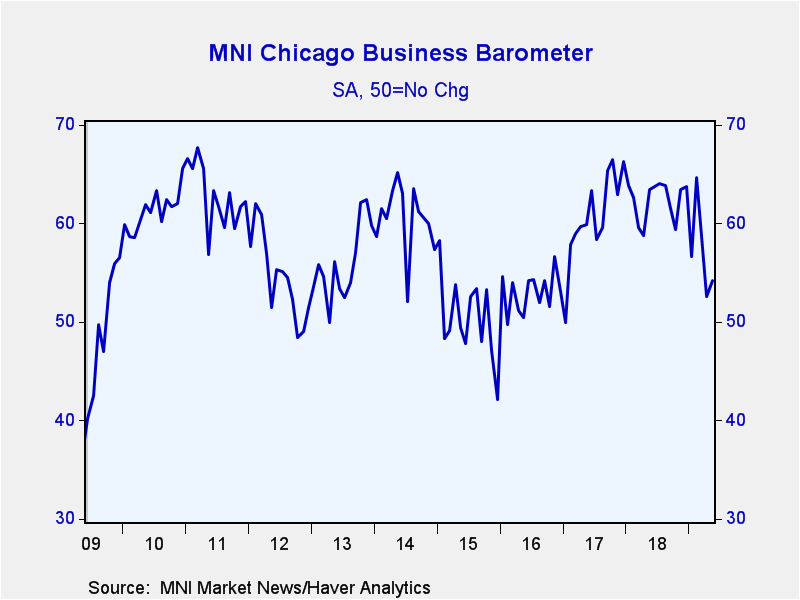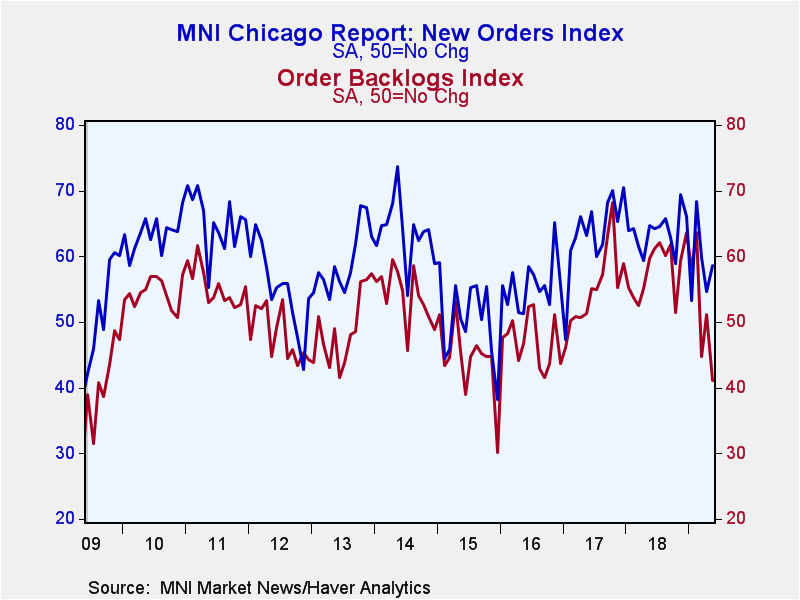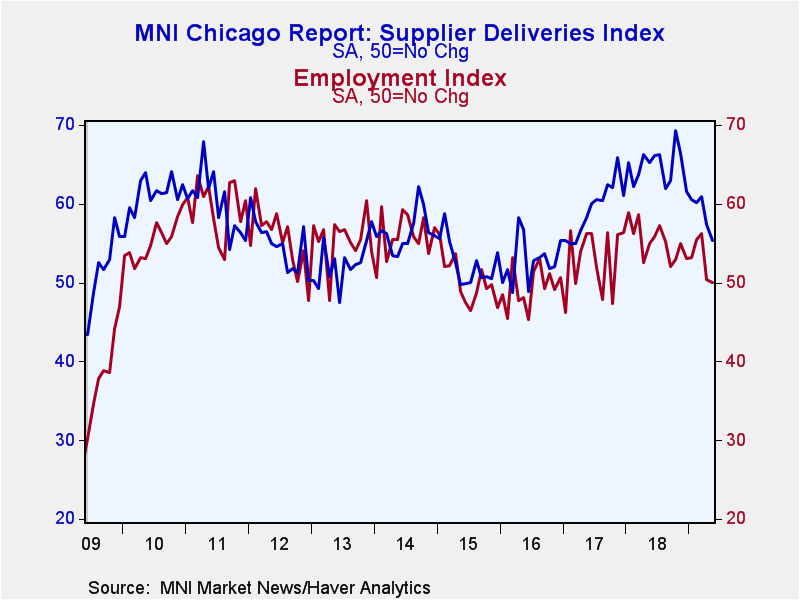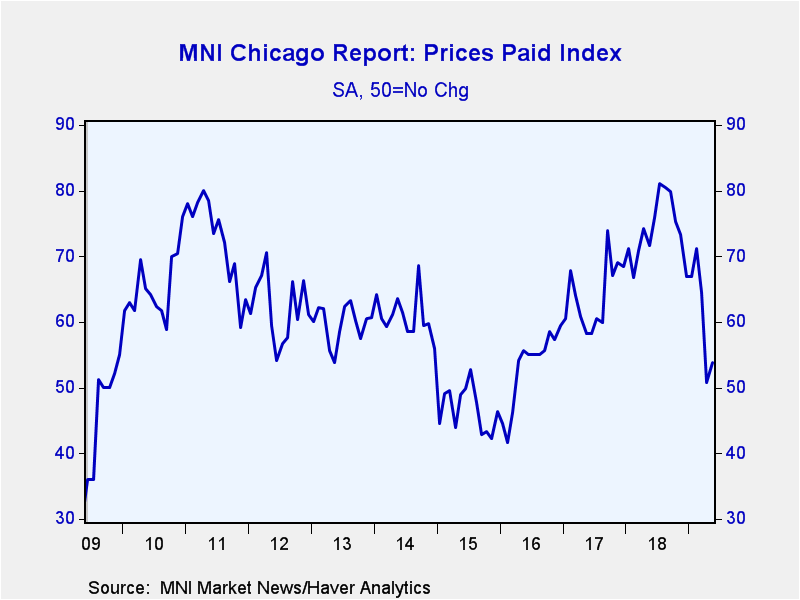 Global| May 31 2019
Global| May 31 2019U.S. Chicago Business Barometer Improves
by:Tom Moeller
|in:Economy in Brief
Summary
The Chicago Purchasing Managers Business Barometer increased to 54.2 during May from April's 52.6, which was the lowest reading since January 2017. The Action Economics Forecast Survey expected a lesser increase to 53.8. The Chicago [...]
The Chicago Purchasing Managers Business Barometer increased to 54.2 during May from April's 52.6, which was the lowest reading since January 2017. The Action Economics Forecast Survey expected a lesser increase to 53.8. The Chicago Purchasing Managers figures are diffusion indexes where readings above 50 indicate growth.
In contrast to the ISM Composite Index, which is constructed from five components, Chicago's General Business Barometer is based on the answer to a single question. Haver Analytics uses Chicago's components to build a headline index using methodology similar to that used to calculate the ISM index. This measure improved to 54.5 in May from 52.6 in April. Over the past 15 years, this ISM-adjusted Chicago index has an 83% correlation with the national ISM Manufacturing Index, which is scheduled for release on Monday.
Improvement in the overall index was accompanied by increases in the readings covering production, new orders and inventories. These gains were offset by declines in the order backlog and supplier delivery series, the latter indicating the quickest rate of order fulfillment since March 2017.
The employment index fell slightly to the lowest point since October 2017. Seventeen percent of respondents (NSA) reported more hiring versus 24% who did so last May. Seventeen percent of respondents also reported less hiring versus 14% twelve months earlier. During the last ten years there has been a 64% correlation between the employment index and the m/m change in factory sector payrolls.
The prices paid index rose slightly but remained well below the highs during the third quarter of last year. Twenty three percent (NSA) of respondents reported higher pries versus 56% a year earlier. Seven percent of respondents reported lower prices versus two percent last year.
The MNI Chicago Report is produced by MNI in partnership with ISM-Chicago. The survey covers a sample of over 200 purchasing professionals in the Chicago area with a monthly response rate of about 50%. Summary data are contained in Haver's USECON database, with detail including the ISM-style index in the SURVEYS database. The Action Economics Forecast Survey is available in AS1REPNA.
| Chicago Purchasing Managers Index (%, SA) | May | Apr | Mar | May '18 | 2018 | 2017 | 2016 |
|---|---|---|---|---|---|---|---|
| General Business Barometer | 54.2 | 52.6 | 58.7 | 63.5 | 62.4 | 60.7 | 53.0 |
| ISM-Adjusted General Business Barometer | 54.5 | 52.6 | 57.7 | 61.3 | 60.7 | 59.0 | 51.9 |
| Production | 57.3 | 50.5 | 64.2 | 66.3 | 64.5 | 64.2 | 54.5 |
| New Orders | 58.6 | 54.6 | 59.8 | 64.7 | 63.8 | 63.6 | 55.6 |
| Order Backlogs | 41.1 | 51.2 | 44.7 | 59.7 | 58.0 | 55.2 | 47.1 |
| Inventories | 51.4 | 49.9 | 47.4 | 55.2 | 55.3 | 54.9 | 47.2 |
| Employment | 50.0 | 50.4 | 56.2 | 55.0 | 55.2 | 52.9 | 49.4 |
| Supplier Deliveries | 55.4 | 57.4 | 60.9 | 65.3 | 64.8 | 59.4 | 52.8 |
| Prices Paid | 53.8 | 50.8 | 64.5 | 71.6 | 74.0 | 64.1 | 53.2 |
Tom Moeller
AuthorMore in Author Profile »Prior to joining Haver Analytics in 2000, Mr. Moeller worked as the Economist at Chancellor Capital Management from 1985 to 1999. There, he developed comprehensive economic forecasts and interpreted economic data for equity and fixed income portfolio managers. Also at Chancellor, Mr. Moeller worked as an equity analyst and was responsible for researching and rating companies in the economically sensitive automobile and housing industries for investment in Chancellor’s equity portfolio. Prior to joining Chancellor, Mr. Moeller was an Economist at Citibank from 1979 to 1984. He also analyzed pricing behavior in the metals industry for the Council on Wage and Price Stability in Washington, D.C. In 1999, Mr. Moeller received the award for most accurate forecast from the Forecasters' Club of New York. From 1990 to 1992 he was President of the New York Association for Business Economists. Mr. Moeller earned an M.B.A. in Finance from Fordham University, where he graduated in 1987. He holds a Bachelor of Arts in Economics from George Washington University.
More Economy in Brief
 Global| Feb 05 2026
Global| Feb 05 2026Charts of the Week: Balanced Policy, Resilient Data and AI Narratives
by:Andrew Cates










